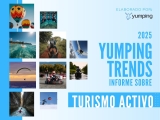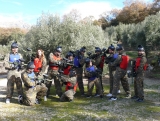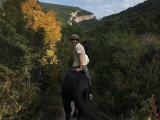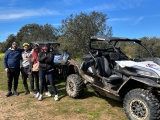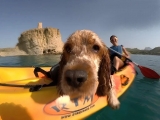On Friday, we decided our weekend should be something different—a bit of active tourism—as we didn’t want to stay in our city. For this reason, one of our friends (a Málaga native) suggested we visit his hometown. So, we headed south, where the climate and the people are among the most pleasant.

On the way, after passing Despeñaperros and entering the province of Jaén, we could appreciate from the window how the Andalusian landscape began to reveal its utterly unique, unmistakable character. We were getting closer to Ronda, and the road signs pointed countless arrows leading to different corners of Andalusia.
And it’s no surprise: nestled in the northwest of Málaga province, Ronda becomes an unrivalled base for exploring all of Andalusia. From here, Seville is under two hours away, Granada just an hour and a quarter, Málaga 50 minutes, and Córdoba barely an hour and a half.

We arrived in Ronda—laughing, dusk-lit, and scented with orange blossoms. Our friends waited to greet us at Plaza de España, near the Parador Nacional, where a welcome dinner awaited at the restaurant "Tragabuches" on Calle José Aparicio. We were treated to a tasting menu of haute cuisine, showcasing Ronda’s gastronomy: vibrant colours, served on sleek, minimalist tableware. Dishes masterfully blended bold flavours, balanced to perfection and plated with exquisite aesthetics.
The streets around Plaza de España buzz with the city’s nightlife: cocktail bars, tapas joints, and clubs. Ronda dreams awake, night after night, savouring every minute until dawn. By day, Calle Nueva and Calle Villanueva—whitewashed and geranium-lined—bustle with locals; by night, they pulse with the revelry of a warm, joyful people who know how to enjoy life with passion.
In the morning, after a rich and varied breakfast, we watched the city wake. We strolled through San Antonio, one of the streets in Ronda’s old quarter, lined with typical whitewashed façades, wrought-iron grilles, and cobblestones, housing local craft and décor shops.
The Parador Nacional de Ronda enjoys a privileged perch atop the Tajo de Ronda—a natural monument and the city’s emblem. Undoubtedly, this is an ancient city, set in a millennia-old region hiding artistic treasures from prehistoric times.

Ronda’s urban core is dotted with archaeological sites, but just 22 km away lies the millennia-old Cueva de la Pileta, home to Paleolithic and Upper Neolithic cave paintings—the most significant in Andalusia. Twelve kilometres from the city, in Ronda’s highlands, rests Acinipo or "Ronda la Vieja," a Roman town where time has spared its theatre, forum, and baths. Before the Romans, Acinipo was a prehistoric settlement, traces of which visitors can still see.
By midday, we paused to eat, breathing the sweet mountain air. We backtracked to Paseo de Blas Infante and the Restaurante Jerez, where we savoured a tasting menu fit for Moorish viceroys. Exquisitely presented, the dishes offered traditional Andalusian flavours in flawless execution—tender, flavourful meats. We indulged in wine tourism, sampling a ’95 reserve with a distinctive, aromatic bouquet that broadens Spain’s portfolio of fine exports.

After lunch, we explored Ronda’s vast trails. By afternoon, we paused for a fragrant, steaming coffee. Ronda boasts extraordinary natural surroundings, nestled between the Sierra de las Nieves and Grazalema Natural Parks—both UNESCO Biosphere Reserves. The latter hides a caving complex, Hundidero-Gato, with Neolithic remains dating from 8,000–5,000 BC.
The Sierra’s villages are carved by the Guadiaro and Genal rivers, their valleys lush with native flora and fauna. Notably, Ronda harbours ancient Pinsapo forests—a species surviving only here and in Morocco, a relic of the Tertiary era. This landscape makes Ronda ideal for hiking, hunting, fishing, paragliding, and caving.

Our last night in Ronda came reluctantly—we were utterly enchanted. The next morning, we rose late and heavy-hearted, unwilling to leave this captivating city... We’ll return, without a doubt.






